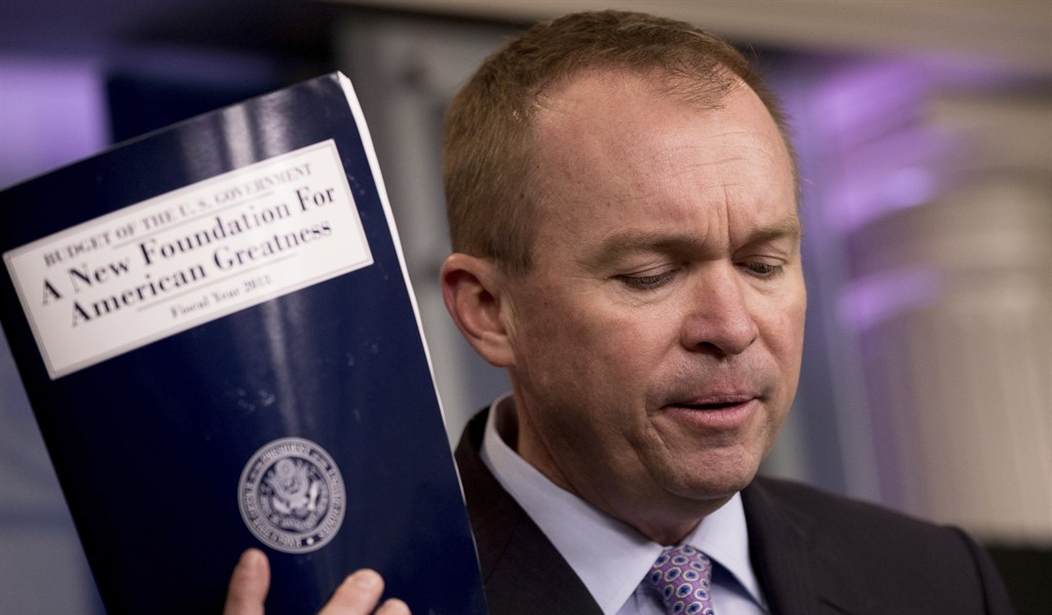When Office of Management and Budget Director Mick Mulvaney unveiled President Trump's new budget, he used language that is so important -- although we haven't heard it in so many years.
To paraphrase Mulvaney, the measure of budget success for the Trump administration is not how much federal assistance is given out but how many people leave government dependency and join the private labor force as full-fledged workers.
The last time I heard a talk like this was over 20 years ago when then-President Bill Clinton teamed with then-House Speaker Newt Gingrich to pass welfare reform. They argued that tighter eligibility, time limits, work search mandates and better training programs would move people from welfare to workfare.
Critics said, "Wait. No -- tougher welfare requirements will throw millions onto the streets with no federal assistance." Turns out they were wrong. Millions moved into the labor force to work productively, grow the economy and provide themselves with new self-esteem and happiness.
The point on happiness is one of my favorites. I learned it from American Enterprise Institute President Arthur Brooks, who has done a number of quantitative surveys that clearly show how people who work for a living are far happier than those who depend on government assistance.
So, now, over 20 years later, Mulvaney is talking workfare over welfare. And, of course, the left-wing screaming has begun.
Recommended
But something must be done. Almost eight years after the recession trough, government benefits for welfare, food stamps (Forty-four million people received food stamp benefits in 2016, compared with 14 million in December 2007), Medicaid and Social Security Disability Insurance are still exploding.
By tightening eligibility and putting back time limits and various work requirements, millions will return to the labor force, just as they did in the mid-1990s.
University of Chicago economics professor Casey Mulligan calls this the "redistribution recession." That is, the best of government intentions have actually backfired by reducing incentives to work and earn.
The expansion of food stamps, welfare, health insurance subsidies, unemployment assistance and disability assistance have led to unintended consequences and perverse after-tax incentives, such that it pays more to stay on assistance then to go to work. At the working-poor margin, taking a job may rob you of Obamacare subsidies, so it's better off not to work.
A couple of years ago, Mulligan estimated that the marginal tax rate -- the extra taxes paid and subsidies forgone as the result of working -- had increased from 40 percent to 48 percent in two years. Progressives hate this viewpoint. But Mulligan summed it up by saying: "Helping people is valuable but not free. The more you help low-income people, the more low-income people you'll have. The more you help unemployed people, the more unemployed people you'll have."
The left is also up in arms because Trump is "slashing" the budget. He's taking food out of the mouths of babies! Killing people for lack of health insurance! Throwing Granny in the wheelchair off the side of the cliff!
But here's a big-picture point: In most cases, the new budget merely slows the rate of spending growth.
Manhattan Institute economist Diana Furchtgott-Roth argues that what the media calls "cuts" are really increases. She's right. The so-called current services baseline goes up every year at 4, 5, 6 or 7 percent or more. So any reduction in the rate of increase is not a cut from last year's spending level.
The Trump budget proposes to raise government spending from $4 trillion today to $5.7 trillion in 2027. That's not a cut. Furchtgott-Roth points out that "the new budget also proposes to increase federal Medicaid spending from $378 billion a year today to $524 billion a year in 2027." That ain't a cut either. It's an increase.
She also notes that America has over 90 anti-poverty programs, 17 food aid programs and 22 housing assistance programs. You think this has been a success? I don't.
Adding up each and every new year between now and 2027, the federal government will spend about $55 trillion. Do we think that's enough? And the Trump budget would curb that by about 7 percent, or roughly $4 trillion. That's all that's happening.
So Mick Mulvaney is right: This is a growth budget. Not because it destroys all federal assistance but because it will reinstitute reforms put in place by Democrat Bill Clinton that will restore incentives to work and remove incentives to not work.
When people re-enter the labor force, it promotes growth. Workfare is better than welfare. And President Trump also aims for a big-bang growth booster with a cut in business tax rates for large and small companies, along with immediate expensing and repatriation.
President is a mighty hard job. Even if he drains the swamp just a wee bit, President Trump will still shake up the establishment.

























Join the conversation as a VIP Member